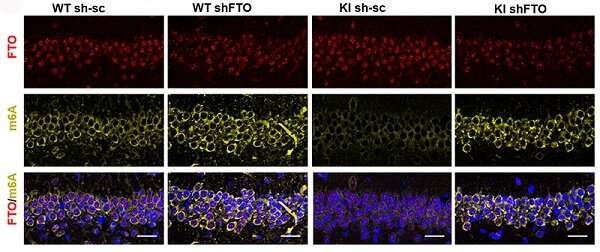Study in animal models identifies genetic marks involved in memory alterations associated with Huntington's disease

Huntington's disease is a rare hereditary neurodegenerative pathology which usually manifests itself between the ages of 30 and 50. It is characterized by the emergence of motor, cognitive and psychiatric symptoms that alter the patient's lives. Historically, motor and cognitive manifestations of the disease had been associated with the dysfunction of corticobasal circuits. However, it is now known that neurodegeneration gradually spreads to other structures of the brain such as the hippocampus, an important region for learning, memory and spatial orientation.
"In this brain area, it seems that certain chemical modifications in the messenger RNA —a molecule that has the necessary genetic information to synthetize proteins— would affect the expression of genes involved in the memory processes," notes Verónica Brito, lecturer at the Faculty of Medicine and Health Sciences of the UB, member of the Institute of Neurosciences of the UB (UBNeuro) and researcher of the IDIBAPS Physiopathology and Treatment of Neurodegenerative Disorders group, led by the UB Professor Jordi Alberch.
Verónica Brito has led a study now published in the journal Cellular and Molecular Life Sciences, focused on the analysis of the modification of the messenger RNA known as N6-methyladenosine (m6A), the most abundant one in the mammalian brain. "Our aim was to identify these RNA alterations and confirm its role in the appearance of cognitive deficits in an animal model with Huntington's disease."
"m6A is an epigenetic mark which consists of the incorporation of a methyl group into the genetic material. This modification acts as a kind of switch that controls gene expression, since it regulates the destination and function of messenger RNAs," notes the researcher, member of the Biomedical Research Networking Center on Neurodegenerative Diseases (CIBERNED).
"The analysis of hippocampal samples from mice used as a model for the disease shows changes in the levels of methylation of messenger RNA related to several Huntington's pathogenic mechanisms; mainly, from the changes involved in the dysfunction of neuronal synapses, both before and after the appearance of symptoms."
The results of the study also show that, after cognitive training, there is an abnormal loss of m6A methyl groups in the hippocampus of the animals in genes essential for the organization of synapses. "This may be the reason for the cognitive deficits caused by the disease, because if we restore the methylation pattern through genetic manipulation, the alterations in spatial memory and recognition improve," says Anika Pupak, first author of the study.
"Accordingly, our research shows that the m6A marks of the messenger RNA form a new signature of post-transcriptional modifications that play a key role in both genetic dysregulation and the onset of cognitive deficits in Huntington's disease," concludes says Sílvia Ginés, professor at the University of Barcelona and co-leader of the research. Both, Pupak and Ginés are also members of the Faculty of Medicine and Health Sciences of the UB, UBNeuro, the research group led by UB Professor Jordi Alberch, IDIBAPS and CIBERNED.
More information: Anika Pupak et al, Altered m6A RNA methylation contributes to hippocampal memory deficits in Huntington's disease mice, Cellular and Molecular Life Sciences (2022). DOI: 10.1007/s00018-022-04444-6















